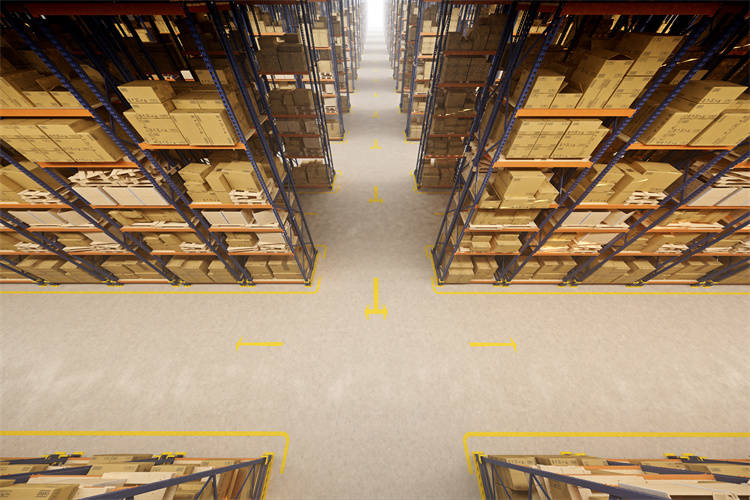Cloud Technology: Shaping the Future of Logistics and Supply Chains

Cloud technology revolutionizes the logistics and supply chain industry, offering unparalleled scalability and efficiency. Its significance in modern logistics cannot be overstated, driving cost reductions, enhancing transparency, and improving accuracy. This blog will delve into the pivotal role of cloud technology in reshaping logistics operations, focusing on real-time data access, scalability benefits, integration with IoT devices, and the future trends that are set to transform the industry.
The Role of Cloud Technology in Logistics

In the realm of logistics, cloud technology plays a pivotal role in transforming operations and enhancing efficiency. By providing real-time data access, companies can make informed decisions swiftly, optimizing inventory levels and streamlining logistics processes.
Real-Time Data Access
Enhancing Visibility
Leveraging cloud-based software such as SaaS allows businesses to access real-time data on inventory levels, customer orders, and shipping schedules. This empowers stakeholders with the necessary insights to enhance visibility across the supply chain network. With this enhanced visibility, companies can proactively address potential disruptions and ensure seamless operations.
Improving Decision-Making
Access to real-time data through cloud solutions enables agile decision-making processes. Key stakeholders can analyze information promptly, identify trends, and respond effectively to market changes. By leveraging cloud technology for data access, companies can optimize their decision-making processes and stay ahead of the competition.
Scalability and Flexibility
Adapting to Demand Changes
Cloud-based logistics software offers unparalleled scalability, allowing businesses to manage resources efficiently and adapt quickly to changes in demand. This flexibility ensures that companies can adjust their operations seamlessly based on market fluctuations without significant infrastructure investments.
Cost-Effective Solutions
By embracing cloud technology, organizations can benefit from cost-effective solutions that align with their business needs. Cloud solutions provide a scalable infrastructure that grows with the business while minimizing operational costs. This cost-effectiveness enables companies to allocate resources strategically and invest in areas that drive growth.
Integration with IoT
Tracking and Monitoring
The integration of cloud technology with IoT devices revolutionizes tracking and monitoring capabilities within the supply chain. By connecting IoT sensors to the cloud, businesses can gather real-time data on shipments, warehouse conditions, and transportation routes. This integration enhances operational visibility and enables proactive decision-making throughout the logistics process.
Cloud-based solutions enable predictive maintenance strategies by analyzing IoT-generated data in real time. Through predictive analytics, businesses can anticipate equipment failures, schedule maintenance activities efficiently, and prevent costly downtime. This proactive approach to maintenance enhances operational efficiency and prolongs the lifespan of critical assets.
Benefits of Cloud Technology in Supply Chains
Efficiency and Speed
Reducing Errors
Incorporating cloud technology in supply chains leads to enhanced efficiency and speed, ultimately reducing errors in various operational processes. By leveraging cloud-based logistics software, organizations can automate tasks, minimize manual interventions, and streamline workflows. This automation reduces the likelihood of human errors, ensuring accurate order processing, inventory management, and shipment tracking.
Streamlining Operations
Cloud solutions play a pivotal role in streamlining supply chain operations by optimizing processes and enhancing overall productivity. Through cloud-based platforms, businesses can centralize data storage, facilitate real-time information sharing among stakeholders, and improve collaboration across departments. This streamlined approach results in faster decision-making cycles, efficient resource utilization, and seamless coordination between different stages of the supply chain.
Cost Reduction
Lowering IT Costs
One of the significant benefits of adopting cloud technology in supply chains is the reduction of IT costs associated with traditional infrastructure maintenance. Cloud-based solutions eliminate the need for extensive hardware investments, ongoing maintenance expenses, and dedicated IT support teams. By migrating to the cloud, organizations can leverage cost-effective subscription models that offer scalable resources tailored to their specific requirements.
Minimizing Infrastructure Investments
Cloud supply chain management presents an opportunity for businesses to minimize upfront infrastructure investments while maximizing operational efficiency. Instead of investing in physical servers or data centers, companies can rely on cloud service providers to host their applications and store critical data securely. This shift towards cloud infrastructure not only reduces capital expenditures but also ensures continuous access to cutting-edge technologies without additional procurement costs.
Enhanced Collaboration
Centralized Data Access
Cloud technology facilitates enhanced collaboration within supply chains by providing centralized data access to all authorized stakeholders. With a single source of truth hosted on cloud servers, teams can access real-time information on inventory levels, order statuses, and production schedules from anywhere at any time. This centralized approach fosters transparency, improves decision-making processes, and strengthens partnerships across the entire supply chain network.
Improved Communication
Effective communication is paramount in optimizing supply chain operations, and cloud technology serves as a catalyst for improved interactions among internal teams and external partners. Cloud-based communication tools enable seamless exchange of information through instant messaging platforms, video conferencing solutions, and shared document repositories. By enhancing communication channels via the cloud, organizations can overcome geographical barriers, resolve issues promptly, and ensure alignment towards common business goals.
Future Trends in Cloud Logistics

As the logistics industry continues to evolve, the integration of cloud technology with cutting-edge advancements such as AI and machine learning is paving the way for transformative innovations. These future trends are set to revolutionize how logistics operations are managed, enhancing efficiency, accuracy, and predictive capabilities.
AI and Machine Learning
Advanced Analytics
The emergence of AI algorithms in cloud logistics has unlocked a realm of possibilities for advanced analytics. By analyzing historical data, market trends, and external factors, these algorithms provide invaluable insights that drive strategic decision-making. AI algorithms can generate accurate demand forecasts, identify cost-saving opportunities, and optimize logistics processes in real time. This sophisticated analysis empowers companies to streamline operations, reduce inefficiencies, and enhance overall performance.
Predictive Capabilities
Machine learning algorithms lie at the core of AI applications in logistics, continuously improving performance over time. These algorithms have the capability to predict disruptions, optimize routes in real time, enable predictive maintenance strategies, and highlight inefficiencies across the supply chain network. The integration of machine learning in logistics not only boosts operational efficiency but also contributes to a seamless customer experience by facilitating faster deliveries and efficient route optimization.
Blockchain Integration
Security Enhancements
Blockchain integration in cloud logistics introduces robust security enhancements that safeguard critical data and transactions within the supply chain ecosystem. By leveraging blockchain technology, companies can ensure secure data exchanges, prevent unauthorized access or tampering of information, and establish trust among stakeholders. The decentralized nature of blockchain enhances data integrity and transparency while mitigating cybersecurity risks associated with traditional centralized systems.
Transparency and Trust
The transparency offered by blockchain integration fosters trust among supply chain partners by providing an immutable record of transactions and activities. This transparency ensures accountability at every stage of the logistics process, from procurement to delivery. With blockchain technology, companies can trace products throughout their journey, verify authenticity, and uphold quality standards. This level of transparency not only enhances operational efficiency but also builds credibility with customers who value visibility into their supply chain interactions.
Cloud technology has reshaped the landscape of logistics and supply chains, offering unparalleled scalability, flexibility, and real-time access to critical data. By optimizing logistics processes and responding swiftly to changing demands, organizations can stay agile in dynamic market conditions. Embracing cloud computing enables companies to anticipate market changes, enhance efficiency, and drive customer satisfaction. As cloud computing gains popularity across industries, businesses leveraging this technology will be at the forefront of operational optimization and future success.
See Also
Digitalizing the Future: Revolutionizing Logistics with Technology
Innovative Cloud Solutions: Transforming Supply Chains
Optimizing Supply Chains through Cloud Tech Solutions
The Impact of Cloud Solutions on Industry Transformation
Tomorrow's Logistics Revolution: The Power of AI in Supply Chains
